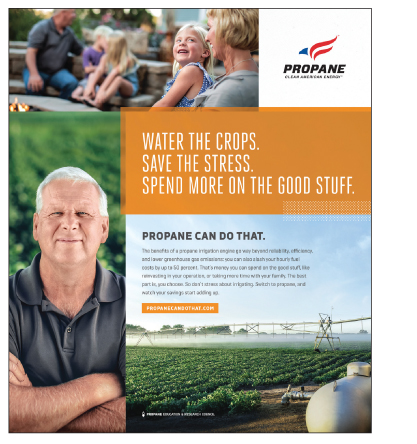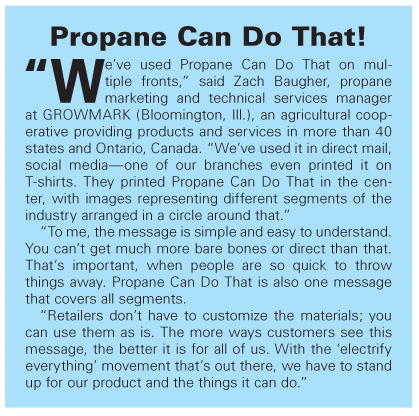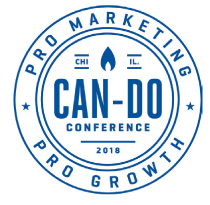
PERC first used the Propane Can Do That theme on a website and in other materials directed at the agriculture market that was launched last summer. Because it has been so favorably received and generated so much interest in that sector, the theme will be rolled out in materials developed for residential consumers this year, and in materials for the rest of PERC’s audiences in 2019.
“Propane Can Do That makes people think about how propane can be used at home and at work,” said Gregg Walker, director of communications at PERC. “Americans don’t know about all the ways propane can be used, but they want to learn more.”
The appeal of Propane Can Do That to residential consumers was confirmed in qualitative concept testing performed for PERC by Harris Insights & Analytics, a global consulting and market research firm. In November 2017, the firm held four two-hour focus group sessions with 33 consumers who do not live on a natural gas line. Each group included a roughly equal number of propane users and non-users.
The firm concluded that the theme piques the curiosity of both, making non-users wonder what propane can do and prompting propane users to wonder what else it can do beyond what they already know.

“We decided to test the theme with homeowner audiences, not with a large quantitative survey, but with qualitative focus groups so we could watch how they react to Propane Can Do That,” Walker explained. “The results were very promising. We found that the theme connected with homeowners in propane country — both users and non-users of propane who live beyond the natural gas mains.”
The response from these residential consumers mirrored the results PERC has seen in the agriculture market. “In the few months we have used the Propane Can Do That theme in the agriculture market, we have been very happy with it,” Walker said. “It really seemed to connect with farmers and producers and those who do business with them.
“We haven’t promoted the Propane Can Do That website much,” he added. “Still, since we launched the site, we’ve had 50,000 visitors and 60,000 sessions. Twenty-five thousand of these visitors have engaged with the site, meaning they have not just glanced at the site, but have watched a video, read a case study, or clicked on one of the links on the site.”
Other Key Insights
In its summary of findings from the residential consumer focus groups, Harris Insights & Analytics highlights some other key insights. One is the appeal of propane-fueled backup power and tankless water heaters. Many of the homeowners in the focus groups had not considered a generator, but were interested in the idea. When asked about a tankless water heater, those who had one said they love the convenience and cost savings it provides, and those who don’t have one said they see propane as a natural fit for this application.
“We found that these two appliances are especially appealing to homeowners,” Walker said. “With tankless water heaters, the homeowners had either used and loved them or had heard good things about them. The backup generators were appealing to homeowners because their power goes out frequently. One of the homeowners near Sacramento [California] told us her power went out a dozen times last year. So, backup power is vitally important to them. Those with propane-fueled generators raved about them, and the non-users wanted to learn more. One electricity user said he was willing to place a propane tank in his yard in order to have a generator that was more efficient than a gasoline-powered one and in order to have fuel on-site.
“Our research indicated that it’s a good idea to start a conversation about those two appliances, because they have a lot of appeal to homeowners,” he added. “If someone with an all-electric home is willing to bring in a propane tank for backup power, he will likely be a very good candidate for more appliances, including outdoor living and even indoor applications as well.”
Another key finding was that the messages about propane that resonate with consumers are ones that explain how they can personally benefit from using the fuel in their home. The two most resounding ideas were “lower energy bills” and “works when the power goes out.” Consumers didn’t respond as well to emotional appeals, descriptions of business uses of propane, or stories about propane retailers’ relationships to the community.
“We found that homeowners respond more readily to rational headlines than to emotional headlines,” Walker said. “They want to read about increased comfort, lower cost, and better reliability. Like propane professionals, homeowners tend to see through the emotional headlines. That suggests the importance of stating the benefits clearly, both in headlines and in the visuals that accompany them in your advertising.”
Resources for Propane Marketers
While PERC is in the process of reworking its marketing programs and converting them to the Propane Can Do That theme, there is a good deal of material for propane marketers to use in the meantime.
The existing Propane Can Do That website for the agriculture market includes videos, fact sheets, case studies, and other materials explaining the benefits of propane-fueled mowers, irrigation engines, crop dryers, building heat, power generators, forklifts, home appliances, vehicles, and flame weeding. These materials are designed to be read, viewed, and shared by agriculture industry professionals, producers, propane marketers, and equipment manufacturers, distributors, and dealers. Links to every resource can be shared on Facebook, Twitter, or LinkedIn. This site address is propanecandothat.com.
PERC offers similar materials for the other markets propane serves, including residential, landscape, golf and turf, on-road fleets, and industrial. For details, visit propane.com.
In a study released last summer, PERC reported that two-thirds of propane marketers had used materials from its earlier consumer campaign, Proudly Propane, Clean American Energy, and six in 10 propane marketers had used one or more of PERC’s other market outreach tools to help attract or retain accounts.
“Follow us on Facebook and Twitter and keep an eye on our website, propane.com, to see the new resources that come online,” Walker suggested.
PERC is also hosting its inaugural Can-Do Conference July 30-31 in Chicago. The conference will bring propane leaders together with marketing experts to discover new strategies, tactics, and tips to use in their propane sales and marketing efforts.
“As retailers are making their marketing plans to promote their companies, I would suggest that they join us in July for the Can-Do Conference,” Walker said. “There, they will be able to learn from experts how to make connections with current and prospective customers.
“This is our first such conference,” he added. “It was developed in response to increased demand for resources about how to reach customers with positive messages. As we all know, there are so many demands on people’s attention today. How can we get their attention with the many reasons for using propane? That’s one of the things the conference will help retailers do.”
Summing up the new conference, marketing materials, and Propane Can Do That theme, and how they can be used by propane marketers, Walker concluded, “I would stress the importance of talking with current customers and prospective customers about the benefits of propane and, more importantly, your company. The best way for retailers to take advantage of the growing awareness and favorability of propane is to promote your company by getting out there as much as you can.”
—Steve Relyea

